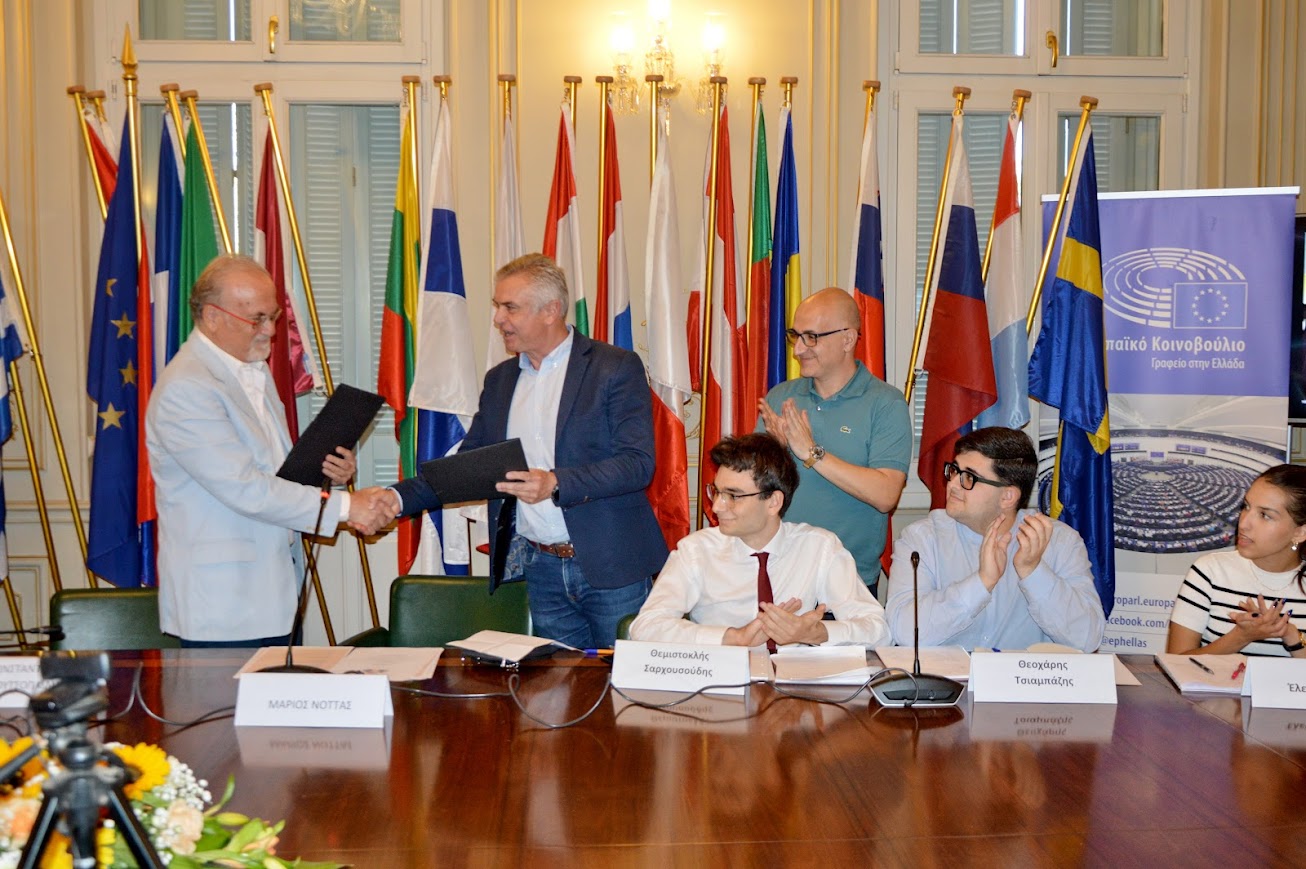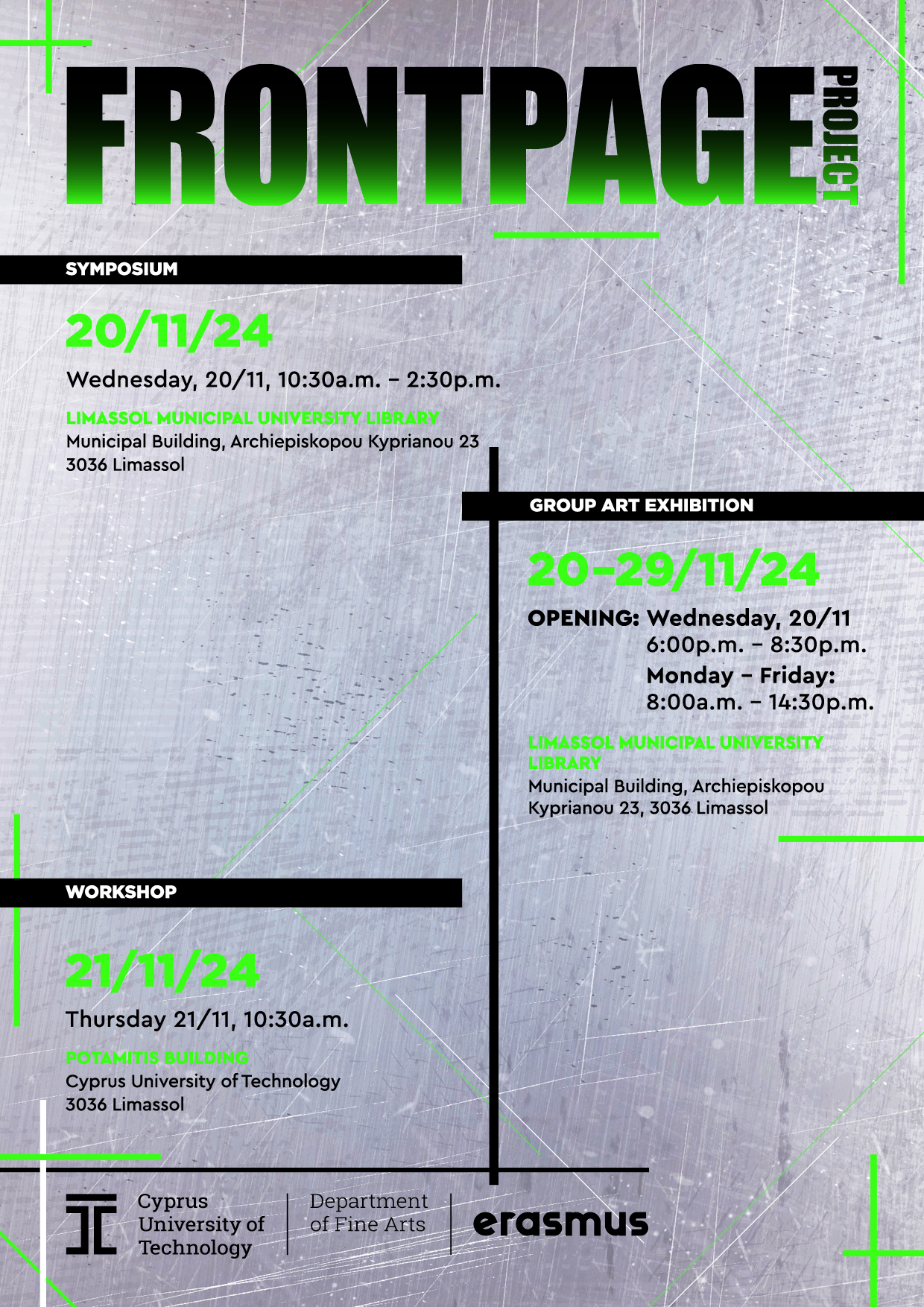ECI
European Communication Institute
A European Public Entities Synergy for Higher Education and Research
The European Ευρωπαϊκό Ινστιτούτο Επικοινωνίας (ECI) is a synergy of the following European public bodies: Austrian University Universität für Weiterbildung Krems, Athena Research Centre, A. Botsis Foundation for the Promotion of Journalism.
MoreThe aim of the Institute is European Integration, through the improvement of communication and understanding of the peoples of Europe through postgraduate education and research in the fields of Humanism, Communication and Information, through which Active Citizenship and – ultimately – Democracy are based.
MoreECI's International PGP 'Quality Journalism and New Technologies', 'Content Marketing and Communication Strategy', 'Humanistic Communication and New Technologies', 'Institutions, Communication and European Integration', 'Psychology and Social Networks', 'Sustainable Tourism and Communication Technologies' and 'Applied Policy and New Technologies' cover four interdisciplinary fields.
More
ECI’s Postgraduate Specialties (Master of Arts) are part of the “Communication & Emerging Technologies” (CET) educational program, have worldwide recognition and equivalence from DOATAP in Greece.
The PGP “Quality Journalism and New Technologies” Master of Arts (QJNT M.A.) examines the parameters that perfect the function of Communication and Journalism theoretically and in practice, with emphasis on the possibilities of digital technology. The architectural curriculum of QJNT M.A. allows for both the transfer and application of modern know-how to students, and the research of journalism of the future. Applying the established principles of quality print media, it explores the challenges of the New Media, aiming at the creation of executives of the field of communication, who, having theoretical and applied knowledge, are able to ‘synchronize’ with the ever-evolving space.
The syllabus of the PGP in Geopolitical Communication and New Technologies – GCNT M.A. aims at the extensive and in depth teaching of critical fields directly or indirectly related to geopolitics, decision-making and crisis management. These concern the educated citizen, as well as the market executive, the policymaker, the diplomat, and the government or security official. There can be no economic, business, investment, academic or cultural activity today, without basic familiarity with the theory of international relations, the wider and local geopolitical developments, the security environment, communication and current technology which, evolving, catalytically affects every activity. In addition, the PGP emphasizes on Security & Leadership issues, as they are shaped in a complex environment.
The PGP “Institutions, Communication and European Integration” Master of Arts (ICEI M.A.) is an innovative curriculum that approaches the issues of operation of the European Institutions with those of the decisive role of Communication and Technology. It examines interdisciplinary issues of Political Science, Technology, Digital Challenges and Communication and Modernization of European Citizens, as these define the case of European Integration. It includes studies and research on sociology, psychology and media with lecturers from Academia, from Excellence and / or executives of the European Administration.
The PGP “Humanistic Communication and New Technologies” Master of Arts (HCNT M.A.) approaches Humanistic Communication, in relation to the other fields of Communication Science, in an applied, broad and interdisciplinary investigation of common social needs. Based on the concepts of “Man-Humanism”, it connects the need for Coexistence with applied political science and communication in the context of Worldviews, Ideologies and – most importantly – in terms of human rights. In the everyday life of modern Democracies, which operate under conditions of Social and Economic Culture, the need to staff state bodies, organizations, NGOs, but also medium to large companies emerges, as part of their obligations, defined as ‘Corporate Social Responsibility’.
Postgraduate Program (M.A.)
Quality Jouranlism and New Technologies
Postgraduate Program (M.A.)
Geopolitics, Communication and New Technologies
Postgraduate Program (M.A.)
Institutions, Communication and European Integration
Postgraduate Program (M.A.)
Humanistic Communication and New Technologies
The PGP “Content Marketing and Communication Strategy”Master of Arts (CMCS M.A.) emphasizes on content production technologies and the Management of Digital – or digitized – media.
Take part in the postgraduate CMCS M.A. and acquire all the necessary skills for a career in the professional field of digital marketing, taking all the necessary knowledge, with emphasis on content creation, from the best in the market.
Psychology is a multidisciplinary and interdisciplinary subject of Studies and Research, interconnecting many different fields of knowledge, theories, methods, techniques and skills.
The PGP “Psychology and Social Networks” Master of Arts (PSSN M.A.) is based on the ‘transcription’ of innovative approaches to the Science of Nature and the disparate territory of human sciences. The revolutionary approaches of Complexity, Chaos, Social Networks and the Social Web (Web Science) shed valuable analytical light on what we call Social Behavior, a central concept that, in recent decades, is beginning to be understood in depth through the systematic scientific study of the Laws of Nature and the research methodology of the sciences.
ECI’s innovative Inter-institutional PGP “Sustainable Tourism and Communication Technologies” Master of Arts (STCT M.A.) provides high-level postgraduate specialization, examining the ‘heavy’ industry of Tourism and Hospitality in the advanced technological environment theoretically and in practice.
The scope and objective of the program is the interdisciplinary training on issues that combine emerging aspects of management and innovation, with emphasis on the Communication of Hospitality Enterprises.
The PGP “Applied Politics and New Technology” Master of Arts (APNT M.A.) covers the pan-European need for training in Management and Policy Making of executives of organizations, large companies, political formations, as well as executives who offer their services to the local, regional and central Governance System.
Its students are trained interdisciplinary in the ever-evolving fields of political science and methods of analysis and interpretation. Thus, they can understand modern political situations and analyze, utilizing technology, the data of conventional and network measurements. Also, to seek and research solutions approaching specific ethical and applied political goals. The main objective of the APNT M.A. is the analysis and understanding of the basic communication structures that govern politics at the multiple levels of its operation.


The European Communication Institute (ECI) is a Synergy of European Public Bodies: Austrian University Universität für Weiterbildung Krems (UWK), Research Center ‘Athena’ of the General Secretariat for Research and Technology, Foundation for the Promotion of Journalism Athanasios Vas. Botsi (charitable body co-supervised by the Ministry of Education).


After his death, on October 25, 1980, by P.D. 563/1981, the Athanasios Vassiliou Botsis Public Benefit Foundation for the Promotion of Journalism was established, according to his will, in order to promote Journalism.

‘Athena’ Research Center (ARC) has the vision to support the full cycle of research and innovation, starting with basic and applied research, continuing with the creation of systems and products, the development and support of infrastructure and completing with technology transfer and entrepreneurship.
Η δημοσιογραφία δεν μπορεί ποτέ να είναι σιωπηλή:
Αυτή είναι η μεγαλύτερη αρετή της και το μεγαλύτερο λάθος της. Πρέπει να μιλήσει, και να μιλήσει αμέσως, ενώ η ηχώ του θαύματος, οι ισχυρισμοί του θριάμβου και τα σημάδια του τρόμου είναι ακόμα στον αέρα.
Δημοσιογράφος σημαίνει νά σβήνεις τελευταῖος τά φῶτα τῆς πόλης
— Σημαίνον άρθρο της 17ης Δεκεμβρίου 2021 στην Εστία, σε pdf
Αυτή η ανάρτηση είναι επίσης διαθέσιμη σε:
![]() Ελληνικά (Greek)
Ελληνικά (Greek)